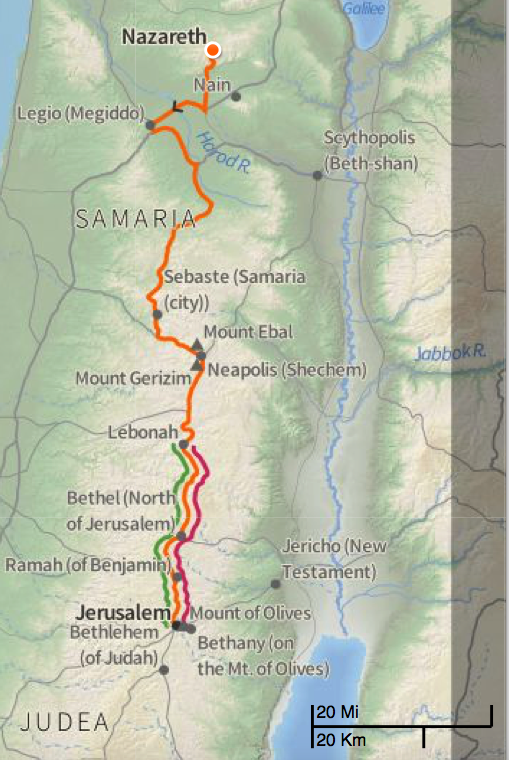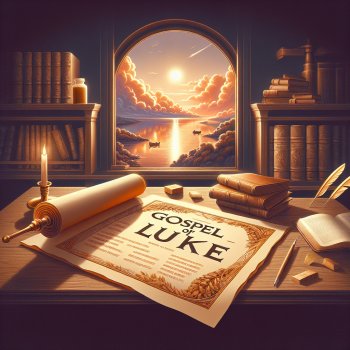Blog Post
Posted by Dion Todd September 16th, 2017 7,943 Views 0 Comments
RHM Bible Study, Luke Chapter Two from Refreshing Hope Ministries on Vimeo.
Today we are going to continue our interactive Bible study, covering Luke Chapter 2. This concludes today’s chapter of our ongoing Bible Study. Thank you for participating and being a part of Refreshing Hope! To complete this study, we invite you to test your knowledge with the accompanying quiz!
Thanks to all that have taken last weeks quiz. We had around 20 participants. 4 people scored a perfect score of 100. The most missed question was how long that Elizabeth hid herself away, 5 months. That was an obscure question but I needed to see if you paid attention.
Luke Chapter 2 WEB: 1 Now in those days, a decree went out from Caesar Augustus that all the world should be enrolled. 2 This was the first enrollment made when Quirinius was governor of Syria. 3 All went to enroll themselves, everyone to his own city.
Luke makes it clear that his story is based on real events that happened “in those days”, and it is actual history. Jesus was born during a very interesting time on Earth and we should examine the setting.

They split the domination of Rome three ways. For decades, the whole Mediterranean world was filled with war and violence. Now that it was split into three pieces, it became far worse. These were years of bloody, brutal fighting for power and money in Rome and its divided provinces. Octavian and Antony pushed out Lepidus, and about 31 B.C. Octavian defeated Antony and Cleopatra’s combined forces, and he took the title Caesar Augustus as ruler over all of Rome. For decades, the world Augustus lived in and Jesus would be born into, the world of the Mediterranean basin, was wrecked by war, destruction, brutality, and immorality.
William Durant recorded that: “The lusty peninsula (of Rome) was worn out with twenty years of civil war. Its farms had been neglected, its towns had been sacked or besieged, much of its wealth had been stolen or destroyed. Administration and protection had broken down; robbers made every street unsafe at night; highwaymen roamed the roads, kidnapped travelers, and sold them into slavery. Trade diminished, investment stood still, interest rates soared, property values fell. Morals, which had been loosened by riches and luxury, had not been improved by destitution and chaos, for few conditions are more demoralizing than poverty that comes after wealth. Rome was full of men who had lost their economic footing and then their moral stability: soldiers who had tasted adventure and had learned to kill; citizens who had seen their savings consumed in the taxes and inflation of war and waited vacuously for some returning tide to life them back to affluence; women dizzy with freedom, multiplying divorces, abortions, and adulteries.”
This was the world that Jesus was born into. Augustus means: “exalted and sacred”. Rome had been a republic, which prided itself on being a nation governed by laws, and not by any man. No man was above the law. Augustus changed all that of, and Rome became an empire with him the emperor. The first emperor of Rome was Caesar Augustus, and the month of August was named after him.
Caesar Augustus called for a census, to register and count all the people. Everyone had to return to their hometown to register and be counted. This was not for record keeping, but It was to efficiently and effectively tax everyone in the Roman Empire. This was known as the “first” census. There were more to follow. One man, in the ivory palaces of Rome, gave a command—and the whole known world had to travel back to their hometown. Though I am sure that Augustus felt powerful, he was just fulfilling Micah 5:2, which prophesied that Jesus would be born in the town of Bethlehem.
4 Joseph also went up from Galilee, out of the city of Nazareth, into Judea, to David’s city, which is called Bethlehem, because he was of the house and family of David; 5 to enroll himself with Mary, who was pledged to be married to him as wife, being pregnant.

6 While they were there, the day had come for her to give birth. 7 She gave birth to her firstborn son. She wrapped him in bands of cloth, and laid him in a feeding trough, because there was no room for them in the inn.
“While they were there” Mary went into labor and gave birth to Jesus. One of the greatest events in history is merely stated as: “She gave birth to her firstborn Son.” Jesus was born in a stable, and laid in a feeding trough. As far as we know, Mary was completely separated from all her family and supporting friends, who lived back in Nazareth. Being that Mary wrapped Jesus in cloth herself, and laid Him in the manger, she was quite possibly alone.
When did this happen? December 25, what we know as Christmas, is improbable, but not impossible; this date was first popularized in the church during the fourth century.

Mary gave birth to Her firstborn son: The logical conclusion is that Mary had other children as well, despite the Roman Catholic dogma of the perpetual virginity of Mary. Matthew 1:25 states that Joseph “knew her not” until Mary had given birth, which tells me that he probably knew her afterwards as his wife. The Bible makes it clear that we not to hold ourselves back from our spouse, and that our body belongs to them. Paul wrote in:
1 Corinthians 7:5 (NKJV) — 5 Do not deprive one another except with consent for a time, that you may give yourselves to fasting and prayer; and come together again so that Satan does not tempt you because of your lack of self-control.
Now I am not sure why someone would believe that a perfectly healthy young woman like Mary withheld herself from her husband Joseph her entire life, but if that was the case, as a man, I can tell you that if I had been Joseph, that eventually Mary would have been single. I know that catholic teachings have made Mary divine, but as far as I can tell, Mary had other children as a healthy wife in a happy marriage would. To me, Mary is best remembered and honored when she is given the normal role of a wife and mother. Now I am not trying to bash Mary, but to me scripture is very clear on this, so let’s read some and then you can make your own decision based on scripture:
Matthew 12:46 (NKJV) — 46 While He was still talking to the multitudes, behold, His mother and brothers stood outside, seeking to speak with Him.
Matthew 13:55–56 (NKJV) — 55 Is this not the carpenter’s son? Is not His mother called Mary? And His brothers James, Joses, Simon, and Judas? 56 And His sisters, are they not all with us?
Mark 3:31–32 (NKJV) — 31 Then His brothers and His mother came, and standing outside they sent to Him, calling Him. 32 And a multitude was sitting around Him; and they said to Him, “Look, Your mother and Your brothers are outside seeking You.”
John 2:12 (NKJV) — 12 After this He went down to Capernaum, He, His mother, His brothers, and His disciples; and they did not stay there many days.
John 7:3 (NKJV) — 3 His brothers therefore said to Him, “Depart from here and go into Judea, that Your disciples also may see the works that You are doing.
John 7:5 (NKJV) — 5 For even His brothers did not believe in Him.
John 7:10 (NKJV) — 10 But when His brothers had gone up, then He also went up to the feast, not openly, but as it were in secret.
Acts 1:14 (NKJV) — 14 These all continued with one accord in prayer and supplication, with the women and Mary the mother of Jesus, and with His brothers.
8 There were shepherds in the same country staying in the field, and keeping watch by night over their flock. 9 Behold, an angel of the Lord stood by them, and the glory of the Lord shone around them, and they were terrified. 10 The angel said to them, “Don’t be afraid, for behold, I bring you good news of great joy which will be to all the people. 11 For there is born to you today, in David’s city, a Savior, who is Christ the Lord. 12 This is the sign to you: you will find a baby wrapped in strips of cloth, lying in a feeding trough.” 13 Suddenly, there was with the angel a multitude of the heavenly army praising God, and saying, 14 “Glory to God in the highest, on earth peace, good will toward men.”
The shepherds of Bethlehem were living out in the field, and keeping watch on their flock. The sheep of Bethlehem were the temple lambs, and the only ones allowed to be used in the temple sacrifices. They were the best of the best. As the Lamb of God, it was appropriate for Jesus to be born in Bethlehem. Also, that area of Judea has a climate remarkably similar to Southern California, so even winters could be pretty mild and living outdoors would have been fine.
An Angel appeared to them, surrounded by the Glory of the Lord, bringing “glad tidings” which literally means they preached the gospel, the good news. The first person to preach the gospel, was this Angel. As usual, the Angel started with: “Don’t be afraid.”
The contrast of the humble birth of Jesus laying in a feeding trough, and the glory of the angels are extreme. Paul tells us in 2 Corinthians 4:7 (NKJV) — But we have this treasure in earthen vessels, that the excellence of the power may be of God and not of us. See God loves to shine His power through the least of the least. The more that humility increases in your life, the more of His power you will carry. Moses was the most humble man on the earth, and the most powerful, until Jesus.
The choice of shepherds was an odd one. Shepherds were regarded as social outcasts. As a class shepherds had a bad reputation. They had a habit of confusing ‘mine’ with ‘thine’ as they moved about the country. They were considered unreliable and were not allowed to give testimony in the law courts.”
15 When the angels went away from them into the sky, the shepherds said to one another, “Let’s go to Bethlehem, now, and see this thing that has happened, which the Lord has made known to us.” 16 They came with haste, and found both Mary and Joseph, and the baby was lying in the feeding trough.
17 When they saw it, they publicized widely the saying which was spoken to them about this child. 18 All who heard it wondered at the things which were spoken to them by the shepherds. 19 But Mary kept all these sayings, pondering them in her heart. 20 The shepherds returned, glorifying and praising God for all the things that they had heard and seen, just as it was told them.
The shepherds immediately went to Bethlehem, they did not wait. When they arrived, they found Mary, Joseph, and the baby Jesus who was lying in a feeding trough. The angel told them to look for a Baby wrapped in swaddling cloths, and lying in a manger. It wasn’t an unusual sign to see a baby wrapped in swaddling cloths, but it was strange to see a baby lying in a manger—a feeding trough. If the angel had not told them to look for such a specific sign, they would never have believed it.
21 When eight days were fulfilled for the circumcision of the child, his name was called Jesus, which was given by the angel before he was conceived in the womb.
22 When the days of their purification according to the law of Moses were fulfilled, they brought him up to Jerusalem, to present him to the Lord 23 (as it is written in the law of the Lord, “Every male who opens the womb shall be called holy to the Lord”), 24 and to offer a sacrifice according to that which is said in the law of the Lord, “A pair of turtledoves, or two young pigeons.”

25 Behold, there was a man in Jerusalem whose name was Simeon. This man was righteous and devout, looking for the consolation of Israel, and the Holy Spirit was on him. 26 It had been revealed to him by the Holy Spirit that he should not see death before he had seen the Lord’s Christ.* 27 He came in the Spirit into the temple.
It was the Holy Spirit who led Simeon to the temple, to be in the right place, at the right time. It is interesting to note that Simeon, who was just a righteous man, was led by the Holy Spirit, before pentecost. God has always welcomed those that diligently seek Him, and He shares things with them.
27 When the parents brought in the child, Jesus, that they might do concerning him according to the custom of the law, 28 then he received him into his arms, and blessed God, and said, 29 “Now you are releasing your servant, Master, according to your word, in peace; 30 for my eyes have seen your salvation, 31 which you have prepared before the face of all peoples; 32 a light for revelation to the nations, and the glory of your people Israel.”
33 Joseph and his mother were marveling at the things which were spoken concerning him, 34 and Simeon blessed them, and said to Mary, his mother, “Behold, this child is set for the falling and the rising of many in Israel, and for a sign which is spoken against. 35 Yes, a sword will pierce through your own soul, that the thoughts of many hearts may be revealed.”
1. Joseph and His mother Mary marveled at the things which were spoken of Him. They were young, suddenly new parents and learning themselves.
2. For the fall and rising of many: this would be shown in the way that Peter repented, but Judas betrayed; one of the thieves blasphemed, while the other believed. Jesus is like a magnet that is attractive to some, but others are repelled from Him.
3. A “sign which will be spoken against” literally means “a target that people will shoot at.” Jesus would be the target of great evil.
4. A sword will pierce through your own soul also: It was important for Mary to know that mothering Jesus would not be all sweetness and light. It was both a great privilege, but also a great burden. She would see Him suffer.
36 There was one Anna, a prophetess, the daughter of Phanuel, of the tribe of Asher (she was of a great age, having lived with a husband seven years from her virginity, 37 and she had been a widow for about eighty-four years), who didn’t depart from the temple, worshiping with fastings and petitions night and day. 38 Coming up at that very hour, she gave thanks to the Lord, and spoke of him to all those who were looking for redemption in Jerusalem.
Like Simeon, Anna was guided by the Holy Spirit to be in the right place, at the right time. She is called a prophetess and must have been at least 103 years old at this time. That is calculating that she married at 12, lived with her husband 7 years, and then was a widow for 84 years. She was a woman of fasting and prayer.
39 When they had accomplished all things that were according to the law of the Lord, they returned into Galilee, to their own city, Nazareth. 40 The child was growing, and was becoming strong in spirit, being filled with wisdom, and the grace of God was upon him. 41 His parents went every year to Jerusalem at the feast of the Passover.

42 When he was twelve years old, they went up to Jerusalem according to the custom of the feast, 43 and when they had fulfilled the days, as they were returning, the boy Jesus stayed behind in Jerusalem. Joseph and his mother didn’t know it, 44 but supposing him to be in the company, they went a day’s journey, and they looked for him among their relatives and acquaintances.
It was customary for the faithful of Galilee to make these pilgrimages at feast time in large groups. They traveled together. It would not be difficult to lose track of a young boy with such a large group of travelers, so we shouldn’t accuse Joseph and Mary of child neglect. But Mary probably felt bad enough, losing the Messiah.
45 When they didn’t find him, they returned to Jerusalem, looking for him. 46 After three days they found him in the temple, sitting in the middle of the teachers, both listening to them, and asking them questions. 47 All who heard him were amazed at his understanding and his answers.
Herod’s temple in Jerusalem was huge, beautiful building with ornate gold and ivory. This is a model of the temple that they visited each year, and where Jesus remained to talk with the teachers. Jesus was missing for three days before His parents found Him sitting with the teachers, listening and asking them questions. Now Jesus was 12 years old, and we consider that young today, but during that time, boys married at 13 years old. Jesus was now a young man.
48 When they saw him, they were astonished, and his mother said to him, “Son, why have you treated us this way? Behold, your father and I were anxiously looking for you.” 49 He said to them, “Why were you looking for me? Didn’t you know that I must be in my Father’s house?”
It is impossible to say when Jesus realized who He was, and what He was sent to do, but it was early on—this scene at the temple is probably not when it began, but much earlier. “I must be about My Father’s business” is the first recorded words of Jesus. In Judaism of that day, a boy began to learn his father’s trade when they were about 12 years of age, so Jesus fulfilled this by learning of His Father’s work at the temple.
50 They didn’t understand the saying which he spoke to them. 51 And he went down with them, and came to Nazareth. He was subject to them, and his mother kept all these sayings in her heart. 52 And Jesus increased in wisdom and stature, and in favor with God and men.
The family returned to their home in Nazareth once again. That was the hometown of Joseph, Mary, and Jesus. He would always be known as “Jesus of Nazareth.” He increased in wisdom and size, and He grew in favor with God and man. He learned carpentry from his Dad, Joseph. Jesus would fulfill the responsibilities expected of the oldest son; and then at some time Joseph disappeared from the scene and Jesus became the “man of the family.” He worked His trade, supported His family, loved His God, and proved Himself utterly faithful in a thousand small things before He ever entered the ministry.
As one wiseman said: “A Christian does not always do extraordinary things. He does ordinary things in extraordinary ways.”
This concludes today’s chapter of our ongoing Bible Study. Thank you for participating and being a part of Refreshing Hope! To complete this study, we invite you to test your knowledge with the accompanying quiz!

This blog post has an accompanying Bible quiz: Luke Chapter 2




Comment from Dion Todd
5 days ago
Great work, Bella! 😀